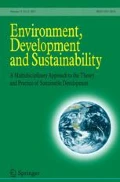Abstract
Increasingly, emphasis is being placed on the role of indigenous or locally crafted natural resources management systems in sustainable natural resources management. While it is generally agreed that their potential to sustain and protect natural ecosystems exists in large measure, such systems are increasingly facing diverse internal and external pressures that threaten their viability. These pressures include demographic and economic change, land privatisation policies, renewable energy investment projects and large-donor-driven livelihood projects. Such pressures and their complexity raise the need to understand how local communities organise to protect resources they collectively value in the face of both internal and external pressures. Based on empirical data collected through interviews, participant observations, focus group discussions and a questionnaire survey conducted with local level actors in Shisholeka village of Central Zambia, this paper shows how local actors, in the absence of state support, react to internal and external pressures to develop robust and locally suited governance and institutional arrangements that best suit their interests in order to sustain their resource base.

Similar content being viewed by others
References
Adams, W. M., & Hulme, D. (2001). Conservation and communities: Changing narratives, policies and practices in African conservation. In D. Hulme & M. Murphree (Eds.), African wildlife and livelihoods: The promise and performance of community conservation. New Hampshire: Oxford and Heinemann.
Argrawal, A. (2001). Common property institutions and sustainable governance of resources. World Development, 29(10), 1649–1672.
Banda, G. (2002). Customary and natural resource management. In IUCN, Human and social perspectives in natural resources management. IUCN: Harare.
Banda, J. A., Banda, P., & Tengnas, B. (1997). Agro-forestry manual for extension workers in central and Lusaka provinces. Nairobi: Regional Soil Conservation unit.
Barrow, E., Clarke, J., Grundy, I., Jones, K. R., & Tessema, Y. (2002). Analysis of Stakeholder power and responsibilities in community involvement in forest management in Eastern and Southern Africa. Nairobi: IUCN.
Bollier, D. (2013). The commons as a new/old paradigm for governance, economics and policy (pp. 18–25). Spring/Summer edition: Kosmos.
Bryant, R. L., & Bailey, S. (1997). Third world political ecology. New York: Routledge.
Chidumayo E (2001) Land-cover transformation in Central Zambia: role of agriculture, biomass energy and rural livelihoods. Paper presented at the international symposium on “Area Studies: Past Experiences and Future Visions” (January 19–22, 2001) at the Kyoto International Community House, Kyoto University, Kyoto.
Chileshe, R. A. (2005). Land tenure and rural livelihoods in Zambia: Case studies of Kamena and St Joseph. Bellville: University of Western Cape.
Chongwe District Development Coordinating Committee. (2005). District situation analysis. Chongwe: Chongwe DDCC.
Clarke, J., Carvendish, W., & Coote, C. (1996). Rural households and Miombo woodlands: Use, value and management. In B. Campbel (Ed.), Miombo in transition: Woodlands and welfare in Africa. CIFOR: Bogor.
GRZ. (2005). Joint forestry management guidelines. Lusaka: Forest Department.
Haans, L. D., & Zoomers, A. (2003). Development geography at the crossroads of livelihoods and globalisation. Econmische en Sociale Geografie, 94(3), 350–362.
Haller, T., & Merten, S. (2005). Institutions change and the state in Zambia. The Common Property Resource Digest, 74, 7–8.
Hardin, G. (1968). Tragedy of the commons. Science, 168(3859), 1243–1248.
Hayes, T., & Persha, L. (2010). Nesting local forestry initiatives: Revisiting community forest management in a REDD+ world. Forest Policy and Economics, 12, 545–553.
Hesse, C., & Ostrom, E. (2007). Understanding knowledge as a commons: From theory to practice. The MIT Press: Cambridge/London.
Hobley, M. (1996). Participatory forestry: The process of change in India and Nepal. London: Overseas Development Institute.
Horning, N. R. (2005). The cost of ignoring rules: Forest conservation and rural livelihood outcomes in madagascar. Forests, Trees and Livelihoods, 15, 149–166.
Jones, S. (2006). A political ecology of wildlife conservation in Africa. Review of African Political Economy, 109, 483–495.
Kangende, K. (2001). Zambian myths and legends of the world. Lusaka: Minta Publishers.
Kirkby, J., O’Keefe, P., & Howorth, C. (2001). Introduction: Rethinking environment and development in Africa and Asia. Land Degradation and Development, 12(3), 195–203.
Kothari, A., Camil, P., & Brown, J. (2013). Conservation as if people also mattered: Policy and practice of community based conservation. Conservation and Society, 11(1), 1–15.
Kothari, A., Corrigan, C., Harry, J., Aulerie, N., & Shrumn, H. (Eds) (2012) Recognising and supporting territories and areas conserved by indigenous peoples and local communities: Global overview and national case studies. Secretariat of the Convention on Biological Diversity, ICCA Consortium, Kalpavriksh, and Natural Justice, Montreal, Canada. Technical Series No. 64, p. 160.
Larson, A. M., Barry, D., Dahal, R. J., & Colfer, C. J. P. (Eds.). (2010). Forests for people: Community rights and forest tenure reform. London: Earthscan.
Lebel, L., Daniel, R., Badenoch, N., Garden, P., & Masao, I. (2008). A multi-level perspective on conserving with communities: Experiences from upper tributary watersheds in montane Mainland South East Asia. International Journal of the Commons, 2(1), 127–152.
Lindsay, J. (2000). Creating legal space for community based conservation: Principles and dilemmas. In T. Enters, P. B. Durst, M. Victor (Eds.), Decentralisation and Devolution of Forest Management in Asia and the Pacific. RECOFTC Report No. 18 and RAP Publication, Bangkok.
Magole, L., Turner, S., & Buscher, B. (2010). Towards an effective governance system in Southern Africa? International Journal of the Commons, 4(2), 602–620.
Mbeyale, G., & Merok, P. (2005). Ujamaa policy and open access in Pangani river basin Rufigi floodplain, Tanzania. The Common Property Resource Digest, 74, 5–7.
Meinzen-Dick, R., & Mwangi, E. (2009). Cutting the web of interest: Pitfalls of formalising property rights. Land Use Policy, 26(1), 36–43.
Movuh, M. C. Y. (2013). Analysing the establishment of community forestry (CF) and its processes: examples from the south west region of Cameroun. Journal of Sustainable Development, 6(1), 76–89.
Nkhata, B. A. (2010). Performance of community: Based natural resource governance for the Kafue flats (Zambia). Environmental Conservation, 37(3), 296–302.
Nyirenda, V., & Nkhata, B. (2013). Collaborative governance and benefit sharing in Liuwa National Park, Western Zambia. Parks, 19(1), 103–114.
Ostrom, E. (1990). Governing the commons: The evolution of institutions for collective action. Cambridge: Cambridge University Press.
Ostrom, E. (2003). How types of goods and property rights. Jointly effect collective action. Journal of Theoretical Politics, 15(3), 239–270.
Pretzsch, J. (2005). Forest related rural livelihood strategies in national and global development. Forests, Trees and Livelihoods, 15, 115–127.
Rigg, J. (2007). An everyday geography of the global south. London and New York: Routledge.
Robbins, P. (2004). Political ecology: A critical introduction. Oxford: Blackwell Publishing.
Ruddle, K., Hviding, E., & Johannes, R. E. (1992). Marine resources management in the context of customary tenure. Marine Resources Economics, 7, 249–273.
Schlager, E., & Ostrom, E. (1992). Property rights regimes and natural resources: A conceptual analysis. Land Economics, 68(3), 249–269.
Singleton, S., & Taylor, M. (1992). Common property, collective action and community. Journal of Theoretical Politics, 4(3), 309–324.
Siurua, H. (2006). Nature above people: Rolston and “fortress” conservation in the south. Ethics and the Environment, 11(1), 71–96.
Sullivan, S., & Homewood, K. (2004). Natural resources: Use, access, tenure and management. In B. Potts & T. Bower-Bowyer (Eds.), Eastern and development challenges in a volatile region. Southern Africa: Pearson Education Ltd, Essex.
Umar, B. B., & Vedeld, P. (2012). Joint forest management in Katanino, Zambia: An inappropriate property regime change? Open Forest Science Journal, 5, 42–52.
Yandle, T. (2007). Understanding the consequencies of property rights mismatches: A case study of New Zealand’s marine resources. Ecology and Socitety, 12(2), 27.
Author information
Authors and Affiliations
Corresponding author
Rights and permissions
About this article
Cite this article
Mfune, O. Managing common pool resources without state support: insights from Shisholeka community in Central Zambia. Environ Dev Sustain 16, 1263–1280 (2014). https://doi.org/10.1007/s10668-014-9526-9
Received:
Accepted:
Published:
Issue Date:
DOI: https://doi.org/10.1007/s10668-014-9526-9




